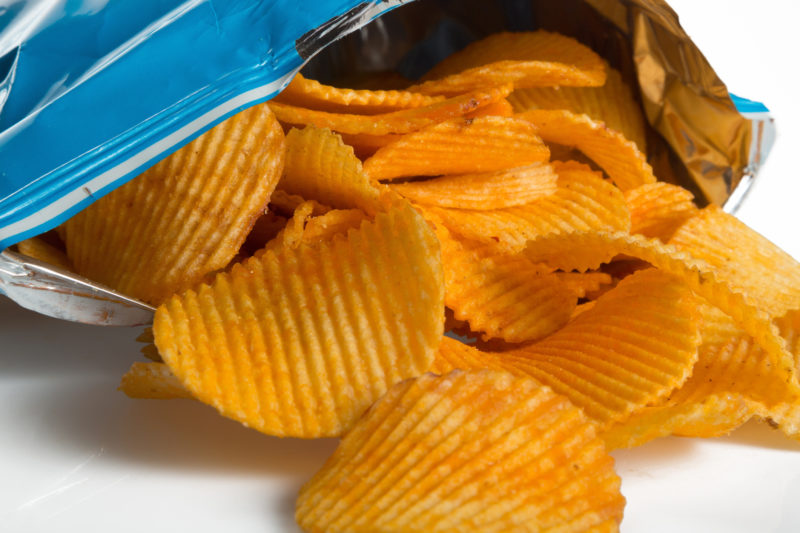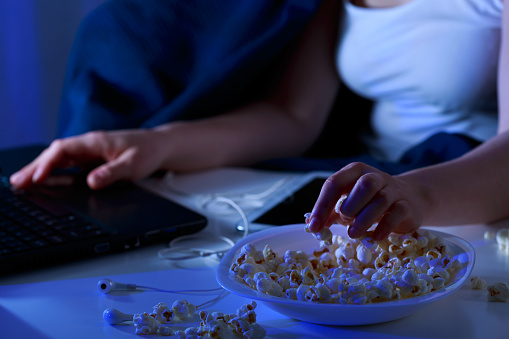7 Weekday Habits That Are Completely Sabotaging Your Weight Loss
Article posted in: Lifestyle
Avoiding bad habits during the week can save you from wrecking your diet when you have fun on the weekends. A 2009 study confirmed that many Americans eat 20 percent more calories on the weekends than on weekdays—a difference of 400 calories per day.
If you’re doing little things during the week that sabotage your progress, they can make you pay for splurging on the weekend. After all, miscalculating your calories by as few as 200 per day will result in more overeating than that 800-calorie weekend overage. Read this article to find out the seven sneaky bad habits that are sabotaging your slim-down.
Save some splurging room for the weekend by avoiding these seven bad habits Monday to Friday:
1. Staying up late binge-watching.
This has become more common on people’s list of bad habits. One more episode won’t hurt, though, right? Wrong: Losing as little as 30 minutes of sleep every weekday can have significant effects on insulin resistance, increasing your risk for Type 2 diabetes and result in weight gain. When you’re low on sleep, studies have shown you’re more likely to have high-carb late night snacks and more likely to eat bigger portions all day.
If a late-night binge-watch session keeps you from your morning workout, you’re not just sabotaging the calorie burn you’d get, but also your sleep the next night: A study of overweight women aged 50 to 75 found that those who exercised 45 minutes in the morning, five days per week, slept 70 percent better than those who exercised in the evening or not at all.
So aim for at least seven hours of shuteye every night: A University of Chicago study found those sleeping seven or more were less hungry than those who slept less and lost twice as much fat.
2. Neglecting the scale.
While it’s true that weighing yourself daily can help you lose (scientists in Minnesota found that dieters who weighed in each day lost twice as much weight as those who did so less frequently), that’s more extreme than you need to be.
At Nutrisystem, we recommend choosing a day and time during which you’ll weigh yourself every week, and then sticking with it. Keep in mind, though, that certain non-diet factors can contribute to fluctuations. For instance, a Canadian study found that water retention on the first day of the menstrual cycle caused heavier weigh-ins. Other studies have found that people are heaviest on the weekends, then lighten up as the week progresses. So consider weighing in during the middle of the week, and adding other ways to measure your progress each week. In addition to the scale, get a tailor’s measuring tape and use it to measure your chest, arm, waist, thigh and calf measurements. When the number on the scale goes up, one of these measurements may go down, so you can still see your progress and stay motivated.
3. Not keeping track of what you eat.
If you aren’t tracking it, chances are you’re eating more than you think. Simply keeping a food diary of what they ate each day helped participants in a 2008 study lose twice as much weight as those who wrote nothing down. So while the weekends might be time to let your hair down, keeping a log of your eating can keep you buttoned up Monday to Friday—and on the track to losing weight.
You can be even more effective if you use your phone: A small study from 2014 found that users of a smartphone app—like the Nutrisystem app—were 20 percent more consistent in logging their meals over eight weeks compared to those who used pen and paper logs.
4. Sitting at your desk all day.
If you clock in, sit down and stay down, you’re putting your health at risk. An American Cancer Society study found that women who sat six hours per day were 37 percent more likely to die during the time period studied than those who sat for three hours or fewer.
It also means you’re burning less fat: University of Missouri scientists found that fat-burning enzymes are “shut off” when you’re not standing, so people who sit all day are “losing the opportunity for optimal metabolism throughout the day.”
So get up! In addition to burning fat, you could be more creative: Scientists at Stanford found that people who walked gave more creative answers on tests of creative thinking than those who tried to solve the problems while seated. Additionally, walking for three blocks of 10 minutes each per day—maybe to lunch, to the coffee machine or for a mental break—can mean burning up to an extra 200 calories daily.
5. Having dinner in front of the TV.
Distracted eaters need more taste sensations—like saltiness, sweetness and crunch—to feel satisfied with their food. A Dutch study found that people had a harder time determining the sweetness of a sugary beverage when they were also trying to concentrate on a mental task.
Concentrating on the act and flavors of the food and eating without distraction is called “mindful eating” and many studies have shown such eating to increase weight loss success without focusing on calories. But you don’t have to meditate while you eat to be mindful: Just turn off Netflix, switch off your phone and focus on your meal. Concentrate on textures and flavors of what you’re eating and you could be satisfied with less… and less likely to snack as the night wears on.
6. Having a late snack… out of a bag.
Eating late doesn’t make you gain more weight—but it can extend the overall time you eat, meaning you eat more calories overall. In a Brigham Young University study, participants who were asked to abstain from eating between 7 p.m. and 6 a.m. for two weeks lost 0.9 pounds per week, reducing their calorie intake by 238 per day.
But if you like eating before bed, that’s OK: Just make sure it’s not high-calorie, high-fat junk food that is easy to overeat. Instead, choose something with complex carbohydrates and lean protein: These will digest slowly so you feel full as you head to sleep. Protein can build fat-burning muscle while you’re in dreamland. Try whole grain cereal with low-fat milk or an apple with a low-fat string cheese. For delicious snacking options that seem too good to be true, explore the Nutrisystem snack menu and stock up!
Just measure your portion of whatever you eat and don’t eat from the bag: Americans are generally bad at estimating portion size. In a study from Nature, men and women correctly guessed the amount of food in a portion only about half the time. They tended to underestimate portion sizes when it came to snacks and sweets. So measure your portion before your snack. Or, better yet, measure it way before: Take some time on Sunday to put containers of pre-measured, healthy snacks like cut-up veggies in the fridge, so you can grab them on weekday evenings. Learn how to become a portion size pro.
7. Looking at your phone in bed.
Research shows that being exposed to dim light during the night can mess up your internal clock, which can lead to weight gain by throwing off your eating schedule. Mice in one study that slept while exposed to a dim light—like a phone—gained 50 percent more weight over an eight-week period than those that slept in total darkness.
In addition to its dim, daylight-colored light, the radiation from your phone can mean it will take longer for you to fall asleep and you’ll spend less time in deep sleep once you do—according to a 2008 study conducted by the phone manufacturers themselves! As mentioned above, losing just 30 minutes of sleep can have an adverse effect on weight gain. Also, late-night phone use could mess up your work life, too: A study from 2014 found that using your phone after 9 p.m. not only disrupted sleep, but caused participants to be less engaged at work the next day, feeling more depleted in the morning.












